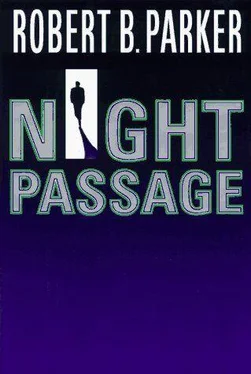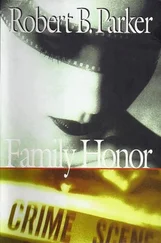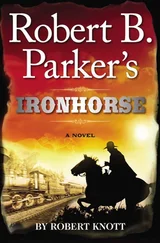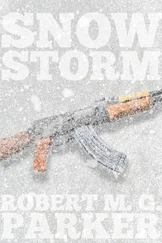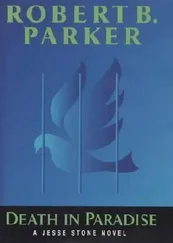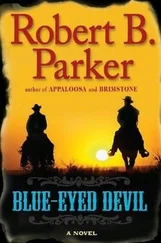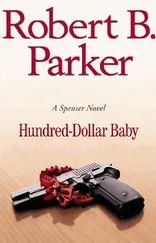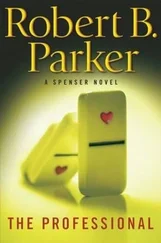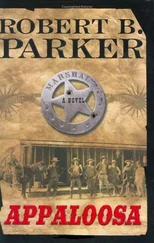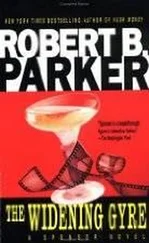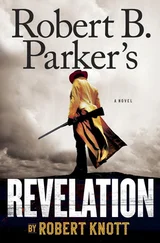Robert B. Parker
Night Passage
For Joan:
Anywhere you are is Shangri-La
At the end of the continent, near the foot of Wilshire Boulevard, Jesse Stone stood and leaned on the railing in the darkness above the Santa Monica beach and stared at nothing, while below him the black ocean rolled away toward Japan.
There was no traffic on Ocean Avenue. There was the comfortless light of the streetlamps, but they were behind him. Before him was the uninterrupted darkness above the repetitive murmur of the disdainful sea.
A black-and-white cruiser pulled up and parked behind his car at the curb. A spotlight shone on it and one of the cops from the cruiser got out and looked into it. Then the spotlight swept along the verge of the cliffs and touched Jesse and went past him and came back and held. The strapping young L.A. patrolman walked over to him, holding his flashlight near the bulb end, the barrel of it resting on his shoulder, so he could use it as a club if he needed to. The young cop asked Jesse if he was all right. Jesse said he was, and the young cop asked him why he was standing there at four in the morning. The cop looked about twenty-four. Jesse felt like he could be his father, though in fact he was maybe ten years older.
“I’m a cop,” Jesse said.
“Got a badge?”
“Was a cop. I’m leaving town, just thought I’d stand here a while before I went.”
“That your car?” he said.
Jesse nodded.
“What division you work out of?” the young cop said.
“Downtown, Homicide.”
“Who runs it?”
“Captain Cronjager.”
“I can smell booze on you,” the young cop said.
“I’m waiting to sober up.”
“I can drive you home in your car,” the young cop said. “My partner will follow in the black and white.”
“I’ll stay here till I’m sober,” Jesse said.
“Okay,” the young cop said and went back to the cruiser and the cruiser pulled away. No one else came by. There was no sound except the tireless movement of the thick black water. Behind him the streetlights became less stark, and he realized he could see the first hint of the pier to his left. He turned slowly and looked back at the city behind him and saw that it was almost dawn. The streetlights looked yellow now, and the sky to the east was white. He looked back at the ocean once, then walked to his car and got in and started up. He drove along Ocean Avenue to the Santa Monica Freeway and turned onto it and headed east. By the time he passed Boyle Heights the sun was up and shining into his eyes as he drove straight toward it. Say goodbye to Hollywood, say goodbye my baby.
Tom Carson sat in the client chair across the desk from Hastings Hathaway in the president’s office of the Paradise Trust. He felt uneasy, as if he were in the principal’s office. He didn’t like the feeling. He was the chief of police, people were supposed to feel uneasy confronting him.
“You can quietly resign, Tom,” Hathaway said, “and relocate, we’ll be happy to help you with that financially, or you can, ah, face the consequences.”
“Consequences?” Carson tried to sound stern, but he could feel the bottom falling out of him.
“For you, and if necessary, I suppose, for your wife and your children.”
Carson cleared his throat, and felt ashamed that he’d had to.
“Such as?” he said as strongly as he could, trying hard to keep his gaze steady on Hathaway.
Why was Hathaway so scary? He was a geeky guy. In the eighth grade, before Hasty had gone away to school, Tom Carson had teased him. So had everyone else. Hathaway smiled. It was a thin geeky smile and it frightened Tom Carson further.
“We have resources, Tom. We could turn the problem over to Jo Jo and his associates, or, depending upon circumstance, we could deal with it ourselves. I don’t want that to happen. I’m your friend, Tom. I have so far been able to control the, ah, firebrands, but you’ll have to trust me. You’ll have to do what I ask.”
“Hasty,” Carson said. “I’m the chief of police, for crissake.”
Hathaway shook his head.
“You can’t just say I’m not,” Carson said. “You don’t make the rules in this town, Tom.”
“And you do?” Carson said.
His face felt stiff as he spoke and his arms and hands felt weak.
“We do, Tom. Emphasis on the ‘We.’ ”
Carson was silent, staring at Hathaway. The mention of Jo Jo had made him feel loose and fragmented inside. Hathaway took a thick stationery-sized manila envelope from his middle drawer.
“You aren’t much of a policeman, Tom, and it was just a sad accident that you learned things. But you did, and you were right to come first to me. I’ve been able to save you so far from the consequences of your knowledge.”
“What if I went to the FBI with this?”
“This is what I’m trying to forestall,” Hathaway said.
“Other people, people like Jo Jo, would prevail. And your family...” Hathaway shrugged and held the shrug for a moment, and sighed as if to himself, before he continued.
“But we both know, Tom, you are not made of that kind of stuff. The better choice for you, and I’m sure you recognize this, is to take our rather generous severance package. We’ve found you a house, and we’ve contributed some cash to help you in relocation costs. The details are in here.”
“What if I promise not to say a word about anything, Hasty? Why can’t I just stay here? You’d have a chief of police that won’t give you any trouble.”
Hathaway shook his head slowly as Carson spoke. He smiled sadly.
“I mean, you know, the next chief,” Carson said, “might be harder to deal with.”
Hathaway continued his sad smile and slow head shake.
“I am trying to help you, Tom,” Hathaway said. “I can’t help you if you won’t help yourself.”
“I’m no troublemaker,” Carson said. “How can you be sure you won’t just get a troublemaker?”
“We have already chosen your successor,” Hathaway said. “He should be just right.”
He held the envelope out toward Tom Carson and, after a moment of empty hesitation, Carson reached out and took it.
Jesse drove out Route 10 past Upland, where he picked up Route 15 and followed it north to Barstow, where he went east on Route 40.
He didn’t turn on the radio. He liked quiet. He set the cruise control to seventy and kept a hand lightly on the steering wheel and slowly settled into himself and allowed his feelings to seep out of the compacted center of himself. He no longer had a badge. He’d turned it in with his service pistol. There was no wedding ring on his left hand. He smiled without pleasure. Turned that in too. It made him feel sort of scared to be without a badge or a wedding ring. Not quite thirty-five and no official status anymore. With his right hand he fished in the gym bag on the front seat beside him until he found his off-duty gun, a short-barreled Smith & Wesson.38. He arranged it near the top of the bag, where it would be easy to reach, and he let his hand rest on it for a time. It made him feel less insubstantial. He stopped at a truck stop outside of Needles, sat at the counter and had orange juice, ham, eggs, potatoes, wheat toast, and three cups of coffee with cream and sugar. It made him feel good. The place was full of truckers and tourists, and he was alone among them. No one paid any attention to him. They were going where they would and he was on his way east. He went to the men’s room and washed his hands and face. Back in the car, cruise control set, he felt a small freshet of excitement. It was afternoon now, the sun behind him. Shining on what he had left. The road spooled out ahead of him, straight to the horizon, nearly empty. Freedom, he thought, and smiled again, no badge, no ring, no problem. You look at it the right way and that’s freedom. He nursed the excitement as long he could, trying to build on it.
Читать дальше
